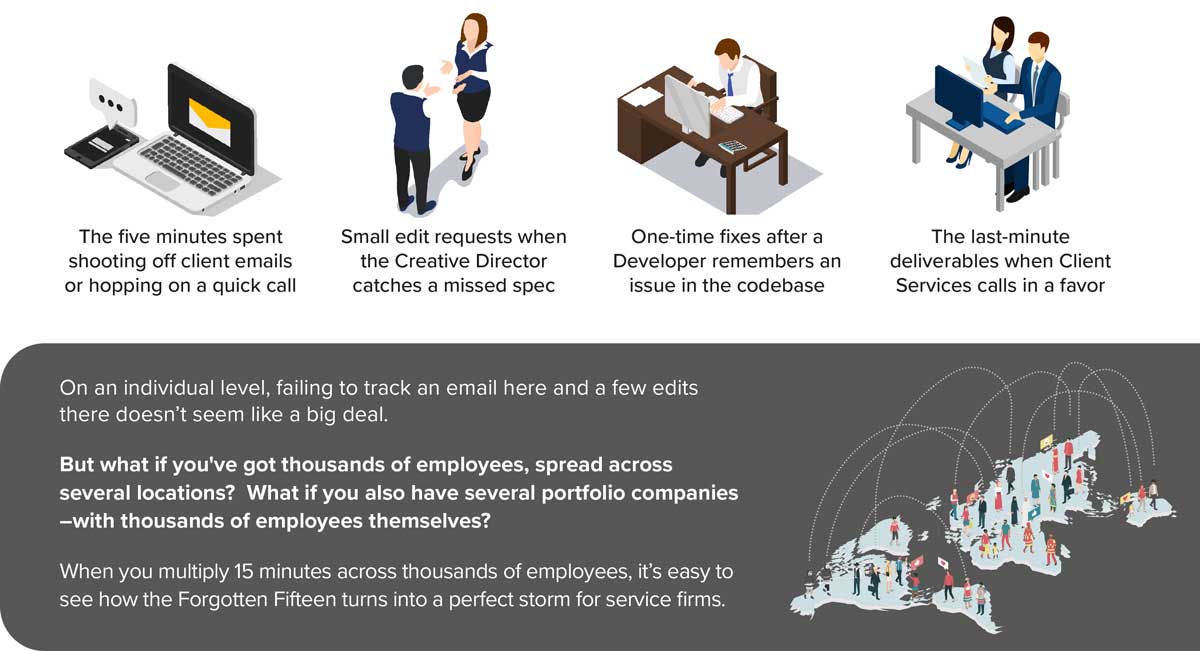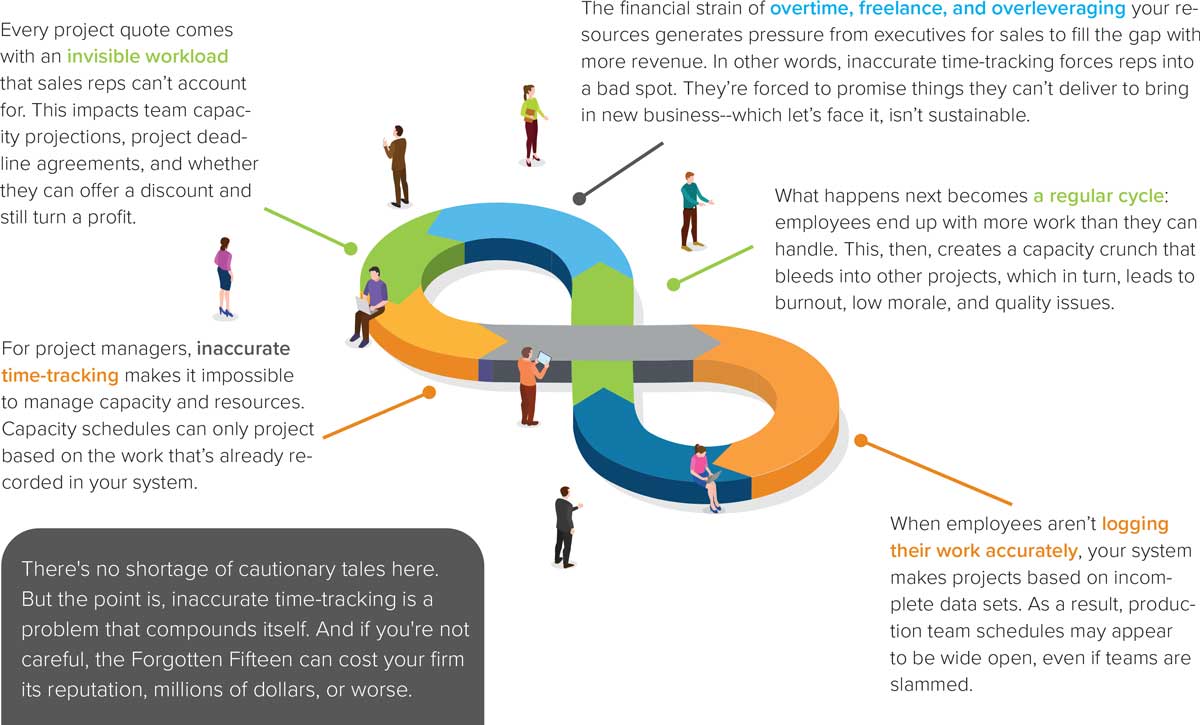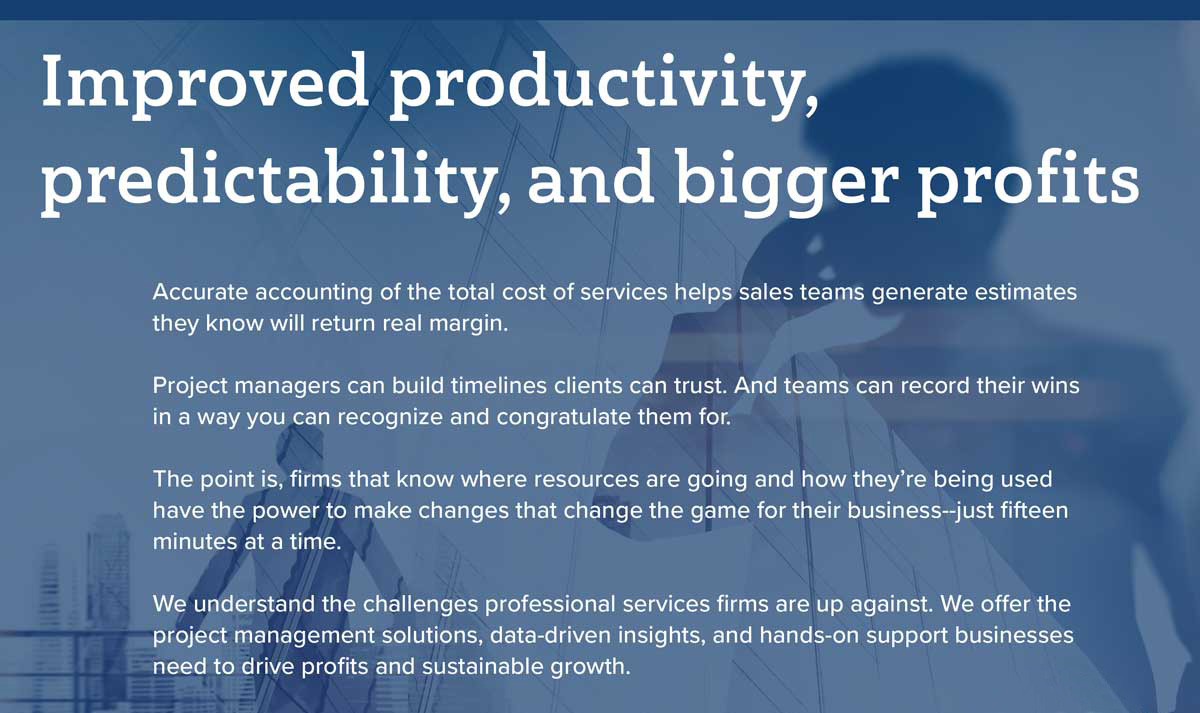How Accurate Time Tracking Can Increase Business Project Margins
In professional services, time logged directly impacts your bottom line, but only if projects stay on budget. For enterprise-level operations managing hundreds or even thousands of billable resources, tracking time accurately is essential. Projects can span months or even years. Its success hinges on profit margins, resource efficiency, streamlined processes, and, most importantly, client satisfaction.
Even the best work and happiest clients cannot offset the damage caused by poor time tracking. Without it, everything unravels.
Keep reading to discover why accurate time tracking is crucial and how to stay ahead of the curve.
Enter the "Forgotten Fifteen"...
The "Forgotten Fifteen" is a term we use to describe the small day-to-day tasks that never make it onto a client invoice or even a Gantt chart. We're talking about:

Why Track the Forgotten Fifteen?
Tracking the Forgotten Fifteen is not about spying on your teams to ensure they are busy. It is about gathering data you can use to increase profit margins. Time-tracking enables firms to boost profits by maximizing efficiency and boosting productivity.
- Measure & optimize employee utilization. Employee utilization represents the number of working hours spent on client work. Higher rates mean more profits. Lower rates suggest that workers are spending too much time on tasks that do not generate business value. The more data you have on how workers spend their time, the easier it is to find and eliminate time-wasting tasks. That way, employees can dedicate more time to client work.
- Eliminate scope creep. Scope creep is a significant problem in the professional services space. It leads to budget overruns, missed deadlines, and increased expenses. The result? Profit margins suffer and so do employees' ability to serve other clients. According to a joint survey by Function Point and the Agency Management Institute, 32% of participants said the biggest barrier to productivity was indecisive clients. Identifying scope creep early in the game allows project managers to nip this problem in the bud. It allows them to set expectations with the client before last-minute changes snowball out of control.
- Stop overservicing. Overservicing means you are providing value-added services at a discounted rate or no cost at all. Workers may want to go above and beyond for their clients but giving away too much hurts profit margins. It also causes delays for other paying clients.
- Improve resource management. According to Wellington’s State of Project Management report, participants cited poor resource management as the biggest challenge facing their organization. McKinsey survey data revealed that 83% of executives believe resource management is the most effective way to boost growth. Again, in professional services, your people are your resources. So, understanding their availability, how they spend their time is essential.
- Focus on the most profitable opportunities. Some projects and clients are more trouble than they are worth. Tracking where you are spending time, energy, and resources allows you to identify projects that are not good for the bottom line. From there, you can refine your strategy and focus on more profitable opportunities.
Why Accuracy Matters in Time Tracking
When knowledge is the product, knowing how much you are selling is the first step toward regaining control over the bottom line. When time and labor are not recorded, every estimate is based on bad data. These miscalculations ripple through the entire business. As an example, consider the project lifecycle:

3 Fundamentals For Tracking The Forgotten Fifteen Across Your Organization
A few key things must be in place to track the Forgotten Fifteen. You will need a unified data system that spans all areas of your business--including any portfolio businesses. You will also need the right tools, along with the policies and workflows that ensure everyone does their part.
Here’s a basic overview:
- Centralize your data
Professional services firms need accurate data, real-time insights, and complete visibility into all aspects of each project, client, and team. Knowing what impacts your profit margin, allows you to spot at-risk projects and take action before they wreak havoc on the bottom line. For that, you will need to ensure all systems, locations, and business functions align around a single source of truth.
- Assemble your time-tracking tech stack
Teams have all kinds of reasons for not tracking their time. One common complaint is many time-tracking solutions are more trouble than they are worth. Employees are often required to log hours in an Excel sheet or App that is disconnected from their day-to-day tools. The result is that employees end up writing off billable hours to fast-track client work. Instead, be sure your time and expense entry systems integrate with the tools your team uses each day.
Beyond time-tracking itself, you will also need an integrated project management and accounting tool. Advanced Projects for Microsoft Dynamics 365 Business Central are two such examples. Advanced Projects provides time-tracking tools for Outlook, Azure DevOps, and JIRA. It also offers cloud-based project management. This includes time entry, approvals, capacity planning, budgeting, and project analytics.
- Rethink your workflows & processes
Good data and the right tools are essential for accurate time-tracking. However, they cannot work their magic if your strategy is no good. Before makin any decisions, review your existing time-tracking, project management, and reporting methods. Ask yourself the following questions:
- How are you currently logging billable hours?
- Are teams following company billing guidelines?
- Do you even have clearly-defined billing guidelines – and are they consistent across departments/locations?
- What needs to happen to improve accuracy and compliance?
- How do you allocate resources
- How do you typically assign projects to employees?
- How is work distributed – are some employees overworked, while others struggle to fill their days?

Get Control of Your Time Tracking – and Your Bottom Line
Accurate time tracking is more than just a best practice. It is essential for protecting your project margins and ensuring your business runs efficiently. Tracking the "Forgotten Fifteen" and organizing your data helps you stay on top of project details. Using better time-tracking tools makes it easier to prevent scope creep, avoid overservicing, and manage resources effectively.
But achieving this doesn't happen by chance. It requires the right strategy, tools, and processes tailored to your business.
The business consulting team specializes in helping professional services firms implement systems that improve time tracking, enhance project visibility, and ultimately boost profitability. Contact us today for a business assessment. Discover how better time management can unlock greater success for your organization.
Let's start a conversation
Since 2021, Kate has led an experienced team of consultants as the Director of Business Consulting. In this role, she empowers organizations to envision new possibilities, achieve goals faster, and operate with greater efficiency.
Don't forget to share this post!
Contact us today to learn more.



